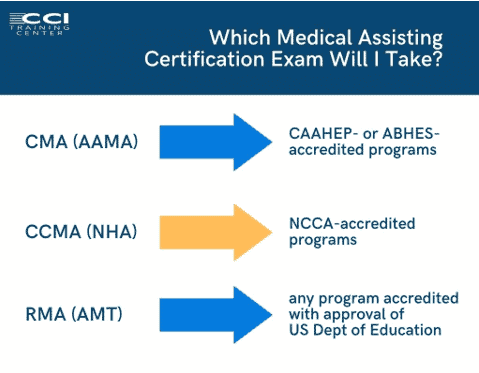
Which Medical Assistant Certification Do I Need?
Search for medical assistant positions on any job board, and virtually all will require some form of certification. These requirements can raise more questions than they answer, such as:
- What is the purpose of all these different types of certifications?
- What is the difference between a CMA, a CCMA, an RMA, and other certification types?
- Which certification is the best fit for me and my goals?

Just as the term “medical assistant” can cover several different types of jobs, medical assistants also need different certifications depending on the type of position.
To help you plan your career path, the following information will break down where these certifications come from, how the different forms of medical assistant certification stack up against each other, and which one will best fit your goals.
Article continues after recommendations
Recommended for you
-
Medical Assistant With Clinical Labs
Take our accelerated Medical Assistant with Clinical Labs program at our Arlington campus and start a new career in as little as 8 months!
-
Medical Assistant With Limited Radiology
Take our accelerated Medical Assistant with Limited Radiology program at our Arlington campus and start a new career in as little as 8 months!
-
Administrative Medical Assistant Program
Our 100% online accelerated Administrative Medical Assistant program makes it possible for you to train for a new career in as little as 6 months!
Major Medical Assistant Certifying Bodies
The most widely recognized certifications come from one of these three national certifying bodies are:
In 2020, the National Healthcareer Association ranked first in the number of Certified Clinical Medical Assistant exams administered at 36,217. American Medical Technologists (AMT) followed up with 8,193 Registered Medical Assistant exams administered, closely followed by the American Association of Medical Assistants (AAMA) with 7,482 Certified Medical Assistant exams administered.

Medical Assistant Certification Options
Entry-level medical assistant positions are generally divided into two categories: a clinical medical assistant or an administrative medical assistant. While the certification requirements of these two types of position overlap, they are not completely identical.
Clinical Medical Assistants
Currently, there is no legal requirement that a clinical medical assistant must be certified in the state of Texas. However, hiring certified individuals is the industry standard, and most medical offices require proof of certification to apply.
For a clinical medical assistant, the most widely accepted forms of certification include:
- Certified Clinical Medical Assistant (CCMA) from the National Healthcareer Association (NHA)
- Certified Medical Assistant (CMA) from the American Association of Medical Assistants (AAMA)
- The Registered Medical Assistant (RMA) certification offered by American Medical Technologists
However, less common forms of certification may also be accepted, such as:
- Nationally Registered Certified Medical Assistant (NRCMA) from National Association for Health Professionals (NAHP)
- Nationally Certified Medical Assistant (NCMA) from the National Center for Competency Testing (NCCT)
- Clinical Medical Assistant Certification (CMAC) from AMCA.
Administrative Medical Assistants
Most positions will simply require one of the above certifications to apply. However, there are also more specialized certifications available:
- The Certified Medical Administrative Assistant certification (CMAA) from the National Healthcareer Association (NHA).
- The Medical Administrative Assistant Certification (MAAC) from the American Medical Certification Association.
Unlike clinical medical assistants, offices hiring administrative medical assistants do not always require certification. However, most entry-level administrative medical assistant positions require previous experience working in a medical office as well as knowledge of medical terminology, and EMR software.
Therefore, if you are truly starting at entry level with no previous medical experience, certification is the best option for building a career in this field.
Which Medical Assistant Certification Should You Choose?
Because the CMA, CCMA, and RMA exams are all held to the same industry standards, the content you would be tested on will be similar. Any of these three options would set you up for success at the start of a career in medical assisting.
The main determining factor on which exam you take depends on the accreditation of your training program. When you are preparing to apply for a medical assisting training program from an educational institution, your admissions representative can advise you on which exam(s) your chosen program makes you eligible to take.
For more information about which institutions qualify, visit the accrediting organizations’ websites for more details:

CMA (AAMA) accreditation: CAAHEP and ABHES
CCMA (NHA) accreditation: National Commission for Certifying Agencies (NCCA)
RMA (AMT) accreditation notes: “Program or institution must be accredited by a regional or national accreditation agency approved by the US Department of Education, The Council for Higher Education Accreditation, or otherwise approved by the AMT Board of Directors.”
Specialized Medical Assistant Certifications
Under uncommon circumstances, medical assistants working in certain specializations may have unique certification needs. Here are a few examples:
Podiatric Medical Assistant (PMAC) Certification, offered by ASPMA (American Society of Podiatric Medical Assistants) and is targeted at the assistance of podiatrists (the treatment of feet).
Certified Ophthalmic Assistant (COA) Certification, offered through JCAHPO (Joint Commission on Allied Health Personnel in Ophthalmology), is designed specifically for the assistance of ophthalmologists (the treatment of eyes and vision).
If you are motivated to work in a certain specialization, research specialized medical assistant certifications in your desired discipline. However, keep in mind that a nationally recognized certification will fit most medical assistant career plans.







